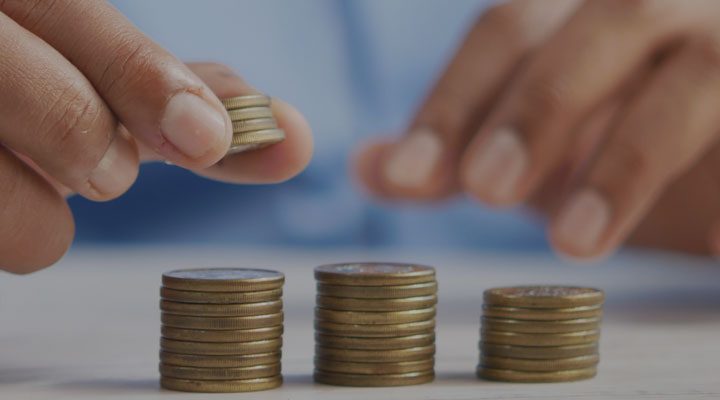Inflation & interest rates explained
Throughout the last 4 years, inflation has been a key concern for everyone around the world, increasing from the target of 2% in July 2021 and peaking at above 10% in 2023. As of February 2025, inflation stood at 3.7% in the UK.
Taking steps to understand how inflation and interest rates in the UK impact each other is a good way of improving your financial wellbeing. On this page, we look at what inflation and interest are, how they work together and how they may affect you.
Inflation is a general increase in prices and fall in the purchasing value of money.
Money loses value unless the nominal interest rate of your savings account is beating the rate of inflation.
Discover ways to protect your savings from inflation.
What is inflation?
Inflation is the rate at which prices are rising, and therefore also the rate at which the value of money is falling. For example, if the cost of a £12 cinema ticket rises by 50p, then cinema ticket inflation is 6%.
As well as goods like food and fuel, inflation applies to services too, like having your windows cleaned or getting a haircut. Inflation targets are set low enough so that the average consumer won’t notice an increase from year to year. However, in the long term, these price rises will have an effect on how valuable your money is and what you can buy with it. This is also known as ‘purchasing power’.
The annual inflation rate for the UK is set once a year by the Bank of England, which is the central bank in the UK. Inflation is calculated by comparing the price of a set list of goods and services against the previous year’s prices. This list of goods and services is called the ‘basket of goods’.
What is the inflation ‘basket of goods’?
The ‘basket of goods’ is a list of around 180,000 products and services that the average consumer purchases. The prices of these products and services are put into the consumer prices index (CPI), the most common measure of inflation.
Inflation is reviewed every year because consumer spending habits change, and different things become popular or in demand. This table shows the difference between the basket of goods in the 1940s vs 2024:
1940s basket staples | Basket additions in 2024 |
Women's corsets, men’s three-piece suits, mangles and vacuum cleaners | Air fryers, vinyl music, gluten free bread, and edible sunflower seeds |
What is the inflation rate used for?
The inflation rate is used by government bodies to make many different financial decisions, including things ranging from pension adjustments to the cost of train fares. Economists also follow inflation closely, since it’s a sign of what’s happening in the economy.
A small amount of inflation is widely considered to be a good thing and a sign of a working economy. However, if prices increase suddenly, it might mean that the economy is being challenged.
So, to strike the right balance, the Bank of England’s inflation target sits at around 2%.
How does inflation affect me?
Most of us are affected by increased prices, but if you earn a low wage or don’t have an emergency fund saved, you’re likely to feel the increases more acutely.
For example, if your salary is rising by less than inflation, the purchasing power of your wages will decrease because what you’re earning won’t get you as far as it used to.
Some people’s income will increase in line with inflation, so while they might notice that things are getting more expensive, they shouldn’t be worse off.
Thanks to the relationship between inflation and interest rates, inflation can also have an effect on your savings and any pension pot you have, which we explore below.
What is the ‘bank rate’?
The bank rate is the interest rate set by the Bank of England, and it’s also known as the base rate.
The base rate affects the UK economy in different ways, including personal finances. For example, it directly impacts how expensive mortgages and loans are, and how much (or how little) savers can earn on their savings deposits.
How do raising interest rates reduce inflation?
In theory, inflation and interest rates directly affect each other. History shows us that when interest rates are low, inflation tends to rise – and conversely, when interest rates are high, inflation falls.
When the cost of living increases sharply, the Bank of England might consider increasing interest rates. When interest rates increase, the cost of borrowing rises, and this means that borrowers have less cash to spend. It also means that if you do have cash, you might be more likely to lock it away in return for high interest payments on accounts like fixed rate bonds.
Essentially, as demand for goods and services fall due to higher interest rates, prices should follow and therefore the inflation rate reduces. This is, however, a tricky balancing act to achieve, especially in an unpredictable economy.
How your money loses value in savings
If you have savings locked away, many economic experts argue that unless the nominal interest rate is beating the rate of inflation, your cash will (in theory) be declining in value. This is known as the Fisher Effect, an economic theory created by economist Irving Fisher. To work out whether your money is losing purchasing power, he developed this formula:
For example, let’s say Alison has found her dream car. The car costs £14,000, and she already has a lump sum of £14,000 to pay for it.
However, Alison wants to take advantage of current interest rates on savings accounts and plans to grow her £14,000 so that next year, she will be able to afford the car and something else after her added interest.
Alison locks her £14,000 in a one year fixed term savings account paying 5% interest. At the end of her term, Alison has £14,700.
However, during this time, the inflation rate was 6%, meaning that the car now costs £14,840. So, because of the difference between the inflation rate and the interest rate over the span of a year, Alison’s savings have lost purchasing power.
Does inflation affect my pension?
Higher rates of inflation can decrease the value of your pension.
This occurs in a similar way to how inflation affects our savings. For example, let’s say your pension grows by 6% in a year, but inflation is 3%. This means your pension will only increase in value by 3% in real terms, because of the rise in prices and the reduction in purchasing power.
Another way inflation can affect your pension is the government’s ‘triple lock’ policy. This policy means that state pension increases each year by whichever is highest out of the following:
- 2.5%
- Inflation as calculated by the consumer price index (CPI)
- Average salary growth
How can the Bank of England tackle inflation?
If the rate of inflation increases quickly and unexpectedly, the Bank of England can try to tackle it by raising interest rates.
This means that if you have borrowed money on a variable interest rate, you could see your monthly payments increase.
The basic principle is that when borrowing costs more, we’ll have less money to spend. That means we won’t buy as much and prices will decrease as a result.
However, if inflation is caused by something external or even global, like the cost of oil or a shortage of lorry drivers, raising interest rates might not be the solution.
How can I protect my savings from inflation?
When inflation is increasing, you might want to consider making investments that could stand a better chance of maintaining their worth. One option to consider might be rare or unique items, such as art or antiques.
This type of investment tends to maintain its worth because these types of assets are in limited supply, and so their prices aren’t affected by inflation. Another way to try and protect your cash from inflation and ensure it holds its purchasing power is by investing in property.
Saving money with Raisin UK
Raisin UK gives you access to a range of competitive savings accounts from our UK partner banks. Simply register for a Raisin UK Account to apply for free today.
Save smarter with the Raisin UK newsletter!
What’s in it for me?
- Receive exclusive updates on market-leading rates
- Ensure you never miss a bonus offer
- Keep your finger on the pulse with the latest financial news





